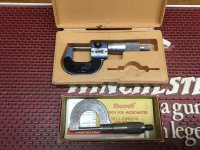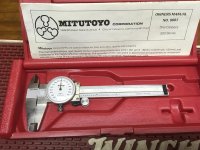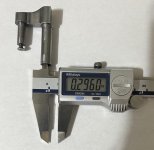Micrometers:
Dial Calipers:
A love story...
Last year, Mrs. Chad asked me if I had a micrometer. I said yes and asked what she wanted to measure. It was a thin sheet of brass that I said was about a millimeter thick.
She didn't want me to measure it for her and insisted on doing it herself. I asked if she wouldn't rather use a dial caliper and she insisted on a micrometer. When I asked if she knew how to use one, she replied "I'M NOT STUPID" and got a bit huffy.
Game on!

I handed her my Starrett's with graduations on the the handle. She looked at it and said, "That's a micrometer?"
Yup...
"That's not what I want".
I then handed her a dial caliper.
"That's what I want!"
She looked at it for minute or two and finally asked me how to use it. I showed her how to hold it, how to zero it, how to measure I.D., O.D. and depth and then stood back and watched.

She finally got the jaws squarely on the sheet, looked at the dial for about a minute and finally fessed up...
"How do read it?"
I explained the inch and tenth of an inch graduations on the bar and the thousandths of an inch graduations on the dial.
She stared at it for a while longer and finally gave in.
"What does it say?"
I told her it read .040", which is about 1 millimeter!
I'll add that she's a wizard at computer programming, business systems and can run sewing/embroidery/quilting machines that I wouldn't touch with a 10' pole. A man needs to know his limitations!




